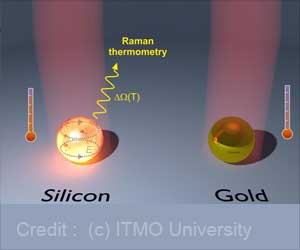Nanoparticles combined with mutant cancer proteins are used to boost the host immune system against cancer.
- Cancer cells undergo numerous mutations and synthesize mutant proteins
- After radiotherapy these mutant proteins are discharged from the cells
- The mutant proteins are used with nanoparticles to boost host immune response against cancer
TOP INSIGHT
The mutant proteins from cancer cells that are combined with the nanoparticles guide the immune cells against the cancer cells.
Senior author of the study, Dr. Andrew Z. Wang, said that the scientists had hypothesized that if they used nanoparticles to grab the cancer proteins then they would be able to improve the immune defense. Dr. Wang is a member of UNC Lineberger and an associate professor in Radiation Oncology in the UNC School of Medicine. Nanoparticles were found to be attractive to the immune system as their size resembles that of viruses, due to which the immune system responds to nanoparticles.
Radiation Therapy
This method of treatment is popularly used to treat many different types of cancer. Scientists have always observed an “abscopal effect", wherein, there is shrinkage of the tumor outside of the primary site treated with radiation. This patient study was published in the New England Journal of Medicine (2012) and detailed the abscopal effect in a patient with melanoma.
This effect was due to the immune cells that were called to the tumor site post radiation. The mutated proteins released by the dying cancer cells were used by the immune cells present to train other immune cells to fight against cancer. This effect of the immune cells works alongside the “checkpoint inhibition” of immunotherapy drugs that are used to eliminate the ‘brakes’ of the immune cells in their fight against cancer.
Dr. Serody further stated that a lot of mutations are present in cancer cells which get synthesized to mutated proteins; these proteins when exposed to the immune system are treated as foreign. Though the body does not respond to the cancer cells as it recognizes them as its own, the mutant proteins that are discharged from these cancer cells are recognized as foreign.
The research team from UNC Lineberger showed in preclinical studies that the nanoparticles could be used successfully to capture the mutant proteins. Immune cells then take up the nanoparticles while the mutant proteins present on their surface can be used to train the immune cells. This defense system will help in eliminating cancer from the rest of the body.
The study findings were
- 20% of mice that were treated with the nanoparticles had a complete response when compared to mice that did not receive the treatment.
- The study shows that there is a potential to improve the immune response of the host, by removing the checkpoint inhibitors, translating into longer survival.
Immunotherapy is a method of treating cancer that is aimed at boosting the immune defenses against cancer. This includes
- Stimulating the immune system to improve it
- Introducing immune system components that train immune cells to specifically target cancer cells
References:
- What is cancer immunotherapy? - (https://www.cancer.org/treatment/treatments-and-side-effects/treatment-types/immunotherapy/what-is-immunotherapy.html)
- Immunotherapy - (https://www.cancer.gov/about-cancer/treatment/types/immunotherapy)
 MEDINDIA
MEDINDIA





 Email
Email










